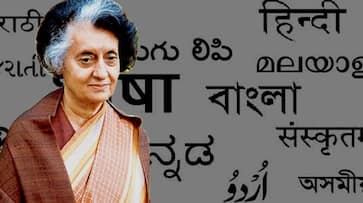It was former prime minister Indira Gandhi who moved five subjects from the state list to concurrent list through the 42nd Amendment Act. Education was one of them.
New Delhi: The 3-language problem, for many old-timers in TN, brings in a sense of dispiriting deja vu. For, this issue is more than 5 decades old. The country would not have had to contend with this vexatious Gordian knot today had it not been for one act of crass vengeance from the Indira Gandhi government.
The talk of 3-language formula has been on in India since the early 60s. But it got more traction with the Kothari Commission ('64-'66) recommending it, among others. The Indira Gandhi government, formulating a National Policy on Education, accepted the recommendations in 1968 and went ahead and passed a Bill for the same in Parliament.
The then 3-language plan is more or less similar to the one being suggested in the draft new education policy now.
(The draft NEP, prepared by a panel led by eminent scientist K Kasturirangan, has put forth a plan to implement three-language formula in schools across the country. It means students in Hindi-speaking states should learn an Indian language, apart from Hindi and English and, in non-Hindi-speaking states, Hindi along with the regional language and English.)
The then 3-language formula kicked up a huge storm in the country, especially in South India. Tamil Nadu was in the forefront of it. In fact, it could be argued that the Dravidian party came to power in the state for the first time in 1967 based on its anti-Hindi protests. The DMK, then headed by CN Annadurai, had managed to capture the imagination of the public in the state by projecting the then ruling Congress as an agent of Hindi hegemony.
So when in 1968, the Centre came up with the Bill for the 3-language policy, the Annadurai-led DMK government in Tamil Nadu hit the streets in massive protests, which till date are seen as a watershed event in the annals of the state history.
The Tamil Nadu government opposed the 3-language plan as it felt that the whole thing was a barely-disguised plan to impose Hindi.
The Annadurai government did not stop with that. In an act of bravura, it went ahead and implemented its own 2-language formula. In this, Tamil was the official language of the state and English the link language.
"It was a momentous period for Tamil Nadu. The state government heroically cocked a snook at the Centre over its education (language) policy," recalls V Kathiresan, a retired state government bureaucrat.
"It was also the period when the assembly passed the resolution for the state's present name from the previous 'Madras State.'"
Even as Tamil Nadu remained intransigent, New Delhi couldn't do anything because education, in the federal set up, was in the state list. Tamil Nadu was practically free to do its own thing.
The Indira Gandhi government was thoroughly embarrassed. It was hoisted on its own petard by a spirited government.
Indira Gandhi probably took this as a personal slight. You have to feel so, especially based on latter-day developments. But she knew she had to remain patient. She understood her time to strike back would come.
It came, but by then Annadurai was long deceased. During the Emergency period in 1976, the Indira Gandhi government, unleashed a torrent of changes to ensure that the power strings are firmly tied to the apron strings of the Centre. It was the act of a dictatorial regime. But she didn't care.
In a fatalistic moment for the country, her government grandiosely moved five subjects from the state list to concurrent list through the 42nd Amendment Act. Education, unfortunately, was one of them.
This essentially meant the Centre can, if need be, supersede a State's Act (through a Central Act) in matters relating to education. From then on, things have not remained the same for the country.
Clearly, Indira Gandhi had not forgotten the snub that she had received on education policy in the 60s.
Her government's diabolic change has meant that the 3-language policy kite is flown from time to time by various governments. But no State government can baulk at the Centre's way firmly (like TN did in the 60s) because education is no longer under the purview of a state alone.
No Central government can make bold to plan changes in language policy in schools had education remained just with the states.
Indira's dangerous gambit has ensured that a ticklish and emotive problem keeps perpetuating.
Last Updated Jun 4, 2019, 2:25 PM IST









![Salman Khan sets stage on fire for Anant Ambani, Radhika Merchant pre-wedding festivities [WATCH] ATG](https://static-gi.asianetnews.com/images/01hr1hh8y86gvb4kbqgnyhc0w0/whatsapp-image-2024-03-03-at-12-24-37-pm_100x60xt.jpg)
![Pregnant Deepika Padukone dances with Ranveer Singh at Anant Ambani, Radhika Merchant pre-wedding bash [WATCH] ATG](https://static-gi.asianetnews.com/images/01hr1ffyd3nzqzgm6ba0k87vr8/whatsapp-image-2024-03-03-at-11-45-35-am_100x60xt.jpg)


